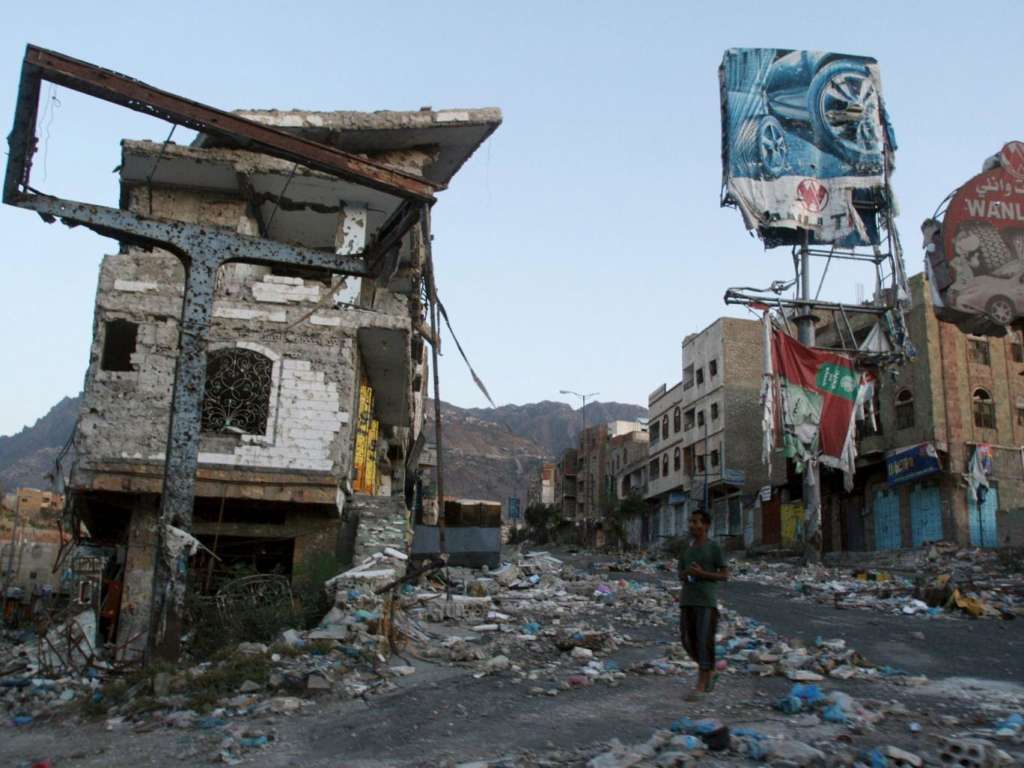Riyadh-The Yemeni peace attempts entered on Sunday a new phase after the Yemeni government accepted a U.N. deal to end the war, placing the Houthi delegation and its ally former President Ali Abdullah Saleh in front of two choices: Either accept the deal by relinquishing all previous ruses or confront the international community.
Yemeni President Abd-Rabbu Mansour Hadi has entrusted the government delegation, currently participating in the peace talks in Kuwait, to ink the agreement on condition that the other party also signs the deal before August 7, which constitutes the end of the extended deadline that Kuwait had agreed on for Yemeni warring parties to end their disputes.
On the other hand, head of the Houthi delegation Mohammed Abdul Salam reiterated the rebels’ previous positions and accused U.N. envoy Ismail Ould Cheikh Ahmed of making the same old suggestions.
Abdul Salam told Asharq Al-Awsat newspaper: “The U.N. envoy has failed to present any vision for a solution, but instead, he discussed ideas similar to the previous ones. There hasn’t been any vision for an agreement plan.”
Yemen’s Interior Minister Major General Hussein Mohammed Arab said the efforts exerted by the Saudi-led Arab coalition to protect the Yemen legitimacy, were the direct reasons behind bringing the rebel forces back to the political negotiations track in Kuwait.
Arab told Asharq Al-Awsat: “The Arab coalition, which supports the Yemen legitimacy, was capable of liberating several regions in the country.”
The Interior Minister said that the Yemeni legitimate forces fully abide by the President’s recommendations to secure a ceasefire, paving the way for additional negotiation efforts. Therefore, he said, rebel forces should assume their responsibilities vis-à-vis the Yemeni people and stop the bloodbath while the international community should continue exerting pressure on the insurgents to implement U.N. resolutions, and push Houthis to withdraw their armed groups from all cities and hand over their weapons.
Arab spoke about a high-level coordination and cooperation between forces of the Arab coalition and the Yemeni interior apparatuses.
However, the Interior Minister was not optimistic about any commitment offered by the rebels in the future, adding: “Those rebel forces would not abide by any agreement and would not consider any political solution we could agree on.”
Meanwhile, adviser to the Saudi defense minister and spokesman for the Saudi-led Arab Coalition in Yemen, Ahmed Al-Asiri, said any attack on the Saudi border is a waste of time for those thinking that such attempts would make them part of any negotiating equation.
Al-Asiri said: “Those who try to put pressure on Saudi Arabia by attacking its borders are delusional. If they want peace, let them go to Kuwait and not the Saudi borders.”
Al-Asiri said the current Yemeni conflict was an internal matter and that the intervention of the Arab coalition came only following a request from the legitimate Yemeni government and therefore, this coalition is not part of the conflict.
The Saudi advisor said: “The Saudi border is challenging for rebels who do not have any political or military target. Saudi Arabia has the needed capacities to infinitely protect its borders.”
Speaking to Al-Hadath, the sister channel of Al Arabiya News Channel, Al-Asiri said: “The Arab Coalition will continue until the militias working against the legitimacy of the government, the Yemeni people and the security of the region, are abolished in Yemen.”
He said that Riyadh “will not accept any violations” after the Saudi military lost seven of its troops while trying to halt Houthi militias from infiltrating the kingdom’ border on Saturday.
Al-Asiri said: “During the past month, we have been providing the U.N. envoy with reports about violations happening on our borders and inside Yemen on a daily basis.”
Meanwhile, the Organization of Islamic Cooperation (OIC) expressed its rejection of the agreement reached between the Houthis and the allies of Ali Abdullah Saleh to form a political council in Yemen.
It said this agreement is considered a violation of Security Council Resolution 2216 and contradicts the regional and international efforts to achieve a political solution to the Yemeni crisis, to put an end to the sufferings of the Yemeni people and to reestablish security and stability in the country.
OIC’s Secretary General, Iyad bin Ameen Madani, renewed the council’s stand in support of the legitimate government in Yemen. He invited the opposition movements in Yemen to respond positively and effectively in their interaction with U.N. envoy Ould Cheikh to reach a consensual solution to the crisis within the framework of the Kuwait negotiations and in accordance with the Security Council resolution, the Gulf Initiative and its executive mechanism, and the outcomes of the comprehensive national dialogue.
Yemeni political analyst Ali al-Bakhiti told Asharq Al-Awsat that if the Yemeni warring parties accept the plan of Ould Cheikh, they would ink the agreement in Kuwait. However, he said, if any of the two parties reject the plan, the U.N. envoy should study any suggested remarks and amend this plan.
Al-Bakhiti ruled out that the warring parties would agree on the current version of Ould Cheikh’s plan, adding that Houthis and their delegation in Kuwait do not welcome it.
He said that the priority now is to focus on the Houthi withdrawal from three main cities: Sana’a, Taiz and Hudaydah, adding that a national unity government should only be formed following the Houthi pullout.
